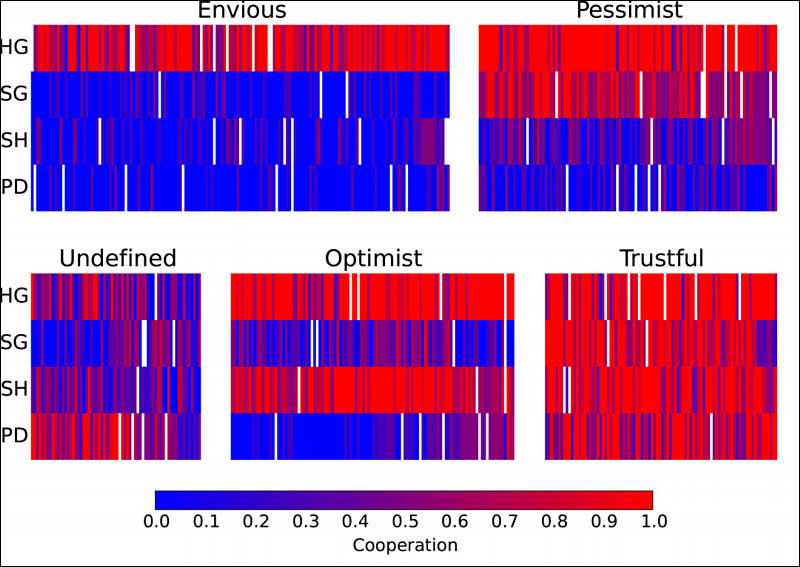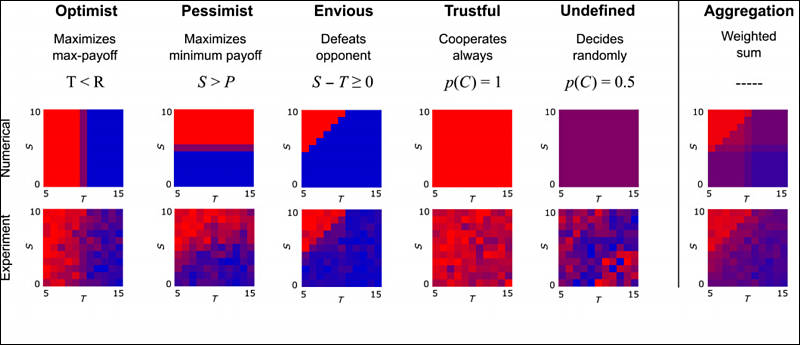
It allows to keep PV going, with more focus towards AI, but keeping be one of the few truly independent places.
-
We recruited 541 subjects of different ages, educational level, and social status during a fair in Barcelona. The experiment consisted of multiple rounds, in which participants were randomly assigned partners and assigned randomly chosen payoff values, allowing us to study the behavior of the same subject in a variety of dyadic games including PD, SH, SG, and HG, with different payoffs. To incentivize the experimental subjects’ decisions with real material (economic) consequences, they were informed that they would proportionally receive lottery tickets (one ticket per 40 points; the modal number of tickets earned was two) to the payoff they accumulated during the rounds of dyadic games they played. The prize in the corresponding lottery was four coupons redeemable at participating neighboring stores, worth 50 euros each.

For every cluster, a column represents a player belonging to his or her corresponding cluster, whereas the four rows indicate the four average cooperation values associated with his or her (from top to bottom: cooperation in HG, SG, SH, and PD games). We color-coded the average level of cooperation for each player in each game (blue, 0.0; red, 1.0), whereas the lack of value in a particular game for a particular player is coded in white. Cluster sizes: Envious, n = 161 (30%); Pessimist, n = 113 (21%); Undefined, n = 66 (12%); Optimist, n = 110 (20%); Trustful, n = 90 (17%).


 img2169.jpg800 x 567 - 107K
img2169.jpg800 x 567 - 107K
 img2170.jpg800 x 345 - 44K
img2170.jpg800 x 345 - 44K
Howdy, Stranger!
It looks like you're new here. If you want to get involved, click one of these buttons!
Categories
- Topics List23,992
- Blog5,725
- General and News1,355
- Hacks and Patches1,153
- ↳ Top Settings33
- ↳ Beginners256
- ↳ Archives402
- ↳ Hacks News and Development56
- Cameras2,367
- ↳ Panasonic995
- ↳ Canon118
- ↳ Sony156
- ↳ Nikon96
- ↳ Pentax and Samsung70
- ↳ Olympus and Fujifilm101
- ↳ Compacts and Camcorders300
- ↳ Smartphones for video97
- ↳ Pro Video Cameras191
- ↳ BlackMagic and other raw cameras116
- Skill1,960
- ↳ Business and distribution66
- ↳ Preparation, scripts and legal38
- ↳ Art149
- ↳ Import, Convert, Exporting291
- ↳ Editors191
- ↳ Effects and stunts115
- ↳ Color grading197
- ↳ Sound and Music280
- ↳ Lighting96
- ↳ Software and storage tips266
- Gear5,420
- ↳ Filters, Adapters, Matte boxes344
- ↳ Lenses1,582
- ↳ Follow focus and gears93
- ↳ Sound499
- ↳ Lighting gear314
- ↳ Camera movement230
- ↳ Gimbals and copters302
- ↳ Rigs and related stuff273
- ↳ Power solutions83
- ↳ Monitors and viewfinders340
- ↳ Tripods and fluid heads139
- ↳ Storage286
- ↳ Computers and studio gear560
- ↳ VR and 3D248
- Showcase1,859
- Marketplace2,834
- Offtopic1,319




